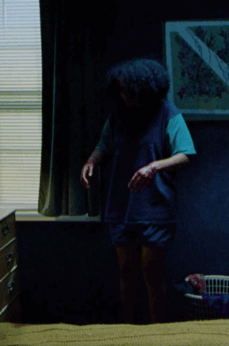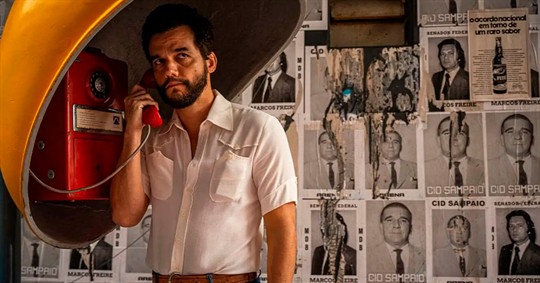
I had the honor of attending the Philadelphia Film Society’s 34th Annual Philadelphia Film Festival for People’s World. I never get to see everything I want at festivals because of phantom illnesses related to “having a day job.” All the same, I prioritized foreign and small films, had a wonderful time, and have highlights to share.
The “After Hours Shorts Program” included eight films, most of which were some combination of horror or comedy. There were technically impressive pictures, cute movies, and hyperviolent animated comedies.
But the most socially meaningful were The Beguiling (Ishkwaazhe Shane McSauby), a horror-satire about fetishizing and appropriating Indigenous heritage, and locally-shot All Things Corrode (Sidney Kreitzer), a body-horror/psychological thriller about a woman who must track down her insurance company’s COO to get approved for medication to treat the rare, fatal skin condition eating her away. It’s the most poignant and specifically American—shot in 2023, its plot correlates with the shooting last year of UnitedHealth Group CEO Brian Thompson—because most everyone can understand struggling with medical bills.
 All Things Corrode
All Things Corrode
Promised Sky (Erige Sehiri) demonstrates discrimination black Africans face in North Africa, focused on the Ivorian community in Tunisia with a documentary-adjacent focus, following pastor Marie (Aïssa Maïga), student Jolie (Laetitia Ky), and young mother Naney (Deborah Lobe Naney). The plot leaves ambiguity as narrative center shifts out of focus in the third act. One arc gets an errant redundant complication intended to add weight. U.S. viewers will connect the criminalization and marginalization on display to the longstanding plight of African-Americans and (especially Latinx) immigrants.
Hopefully, the audience hears the quietly explicit critique that much North African immigration pressure comes from Europe (as much on Mexico toward Central Americans comes from the U.S.). Its main aesthetic flaws are that many beautiful shots feel cliché and the refugee girl (Estelle Dogbo as Kenza) who spurred the plot into action is mostly an object to which people respond rather than a subject with agency.
Hysteria (Mehmet Akif Büyükatalay) is a dramatic thriller following escalating scandal after a Quran is burned during filming of a movie recreating the real-life 1993 Solingen arson. Hysteria engages with how class, time, and experience shape visions of art, religion, cultural sensitivity, and social identity. Ultimately, the mounting mysteries end ambiguously as the climax shifts from drawing room showdown into another disaster. It’s an unfortunate choice for those of us locked in on the drama, but the director uses spectacle to underline that arguments of propriety pale in comparison to mortal danger.
 Promised Sky
Promised Sky
Lesbian Space Princess (Emma Hough Hobbs and Leela Varghese) is an animated comedy of puns and songs. Its social commentary is not avant-garde but potentially socially useful as the “West”/“Global North” (geographically-illogically including the film’s home, Australia) push toward regression and reaction. Titular protagonist Saira (Shabana Azeez) goes on a galaxies-spanning mission to rescue her self-absorbed bounty hunter ex-girlfriend, facing down an anthropomorphic phantom of self-doubt and self-loathing to summon her magical labrys.
Her interstellar travels are complemented by Leela Varghese’s pleasant sometimes-diegetic music, plus a colorful cast of characters that include villainous Straight White Maliens and a talking “Problematic [space]Ship” Saira travels in that starts with microaggressions and grows into allyship.
The Secret Agent/O Agente Secreto (Kleber Mendonça Filho) follows a former college professor (Wagner Moura as Armando/Marcelo) on the run in 1977, during Brazil’s military junta (1964-1985), retreating to his hometown of Recife to lay low under an assumed identity, recover his child, and flee the country.
Rather than dive into the technical structure of the military dictatorship (or the U.S.-supported coup that put it in place), the film focuses on consequences of violent right-wing governance—flourishing police corruption, private industry dictating state education policy and courting assassins, and people being disappeared or forced to flee their homes.
It is beautifully shot and convincingly acted, demonstrating Recife’s beauty and diversity, dotted with strange flourishes like a sensational newspaper comic story coming to life. Partway through, the film introduces a broader framing story of contemporary Brazilian researchers digitizing recordings of Armando’s life while learning about the experiences of refugees from the junta, in effect exemplifying the necessity of truth for reconciliation.
 The Secret Agent / O Agente Secreto
The Secret Agent / O Agente Secreto
Right-wing President Michel Temer’s government boycotted Mendonça’s 2016 film, Aquarius, from being Brazil’s submission to the Academy Awards’ Best Foreign Language Film category. Jair Bolsonaro allegedly did the same with his 2019 film Bacurau. All the same, The Secret Agent/O Agente Secreto will be the second consecutive film about the brutal military junta (after Walter Salles’s I’m Still Here/Ainda Estou Aqui) for Brazil to submit as their entry to the Oscars’s Best International Feature.
A small part of solidarity with workers around the world is learning from the resilience artists elsewhere show in telling the stories of marginalization and minimization—and pushing to have them seen in the core of the empire.
We hope you appreciated this article. At People’s World, we believe news and information should be free and accessible to all, but we need your help. Our journalism is free of corporate influence and paywalls because we are totally reader-supported. Only you, our readers and supporters, make this possible. If you enjoy reading People’s World and the stories we bring you, please support our work by donating or becoming a monthly sustainer today. Thank you!
CONTRIBUTOR

